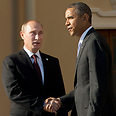
Syrian deal: World interest map
Obama evaded attack, made Russia fold; Putin killed three birds with one stone; Assad is left standing; Europeans can quietly recuperate from crisis. Meaning of upcoming Syria deal for Israel, Iran
World peace hasn't arrived, but the world awoke Tuesday to a new morning where a Syria military intervention seems far less likely.
It's unclear yet whether the Russian initiative to disarm Syria is serious, or whether it is a ploy meant to stall an upcoming strike in Syria. It's time to check the meaning of the deal for each of the players in the Syria arena.
United States
Serious or not, the Russian initiative is an achievement to the Obama administration. It's clear that his determination to receive legitimacy for a punitive measure against Syria is what pushed the Russians and their Syrian clients to the corner, making them seek a diplomatic solution that would please Americans.
If the Russian initiative comes through, it will stop Assad from using chemical weapons in the future, and make an American strike, which the public, Congress and Obama himself don't want, useless. Another achievement would be a clear signal to Iran. Obama walked on the edge, Putin had to blink, and the Middle East countries saw that the threat works.
Russia
Putin is benefiting no less than the US. He's positioning Russia as a worthwhile empire through the crisis so far. He mainly garners himself international prestige as not only the responsible adult, but also the creative one, who killed three birds with one stone: Prevent future use of chemical weapons by Syria, thus placing himself as part of Western society; stall or prevent an American strike in Syria; and remain loyal to his client, Assad, which gives him extra points in the Middle East.
Syria
If the Russian initiative comes through, Assad has kept himself from huge trouble. An American strike would have surely weakened his army and abilities, possibly swaying the results to the rebel's favor. In an interview to CBS he seemed utterly panicked.
The compromise on his part isn't huge, either: If he disarms of chemical weapons, he still has all his other capabilities, and the legitimacy to keep fighting rebels using Russia, Iran and Hezbollah. Lately he seems to be winning the war, so he has every reason to be happy if Americans don't strike. A bonus from Russia for accepting the deal could mean new weapons for the Assad regime as well.
Israel
They should be pleased in Jerusalem - it's been proven that a reliable American option holds deterrence. The Iranian angle is also clear, as is the direction of any future moves of the US and Israel against Tehran.
In order to use chemical weapons on his own citizens or against Israel, Assad doesn't need all 1,000 tons of chemical warfare he has. He could do with 1% of that amount. Another danger that is of special interest to Israel: If the negotiation draws on, Syria can transfer and conceal at least part of its chemical arsenal and give it to Hezbollah in Lebanon. This is the worst case scenario as far as Israel is concerned, as bad as chemical weapons falling into the hands of Jihadists in Syria.
Even though the odds of a Syrian strike on Israel in the event of an American military intervention are low, it's clear that if the Russian initiative comes through, Israel can be calm. Being on alert is also energy- and time-consuming.
Iran
Iran is learning that Americans can be persistent, and that it's very wise to heed Russian advice. In Moscow they are also against a nuclear Iran, and an American-Russian advance will be much more welcome in Tehran than it would have been so far.
The American show of strength in the Mediterranean and the Gulf was a real demonstration to the Iranians as to what could happen to them if they push the US past a certain threshold. President Rohani's response Tuesday morning is already testimony to panic. On the other hand, Iran gains as its loyal ally, Assad, stays in power.
European countries
The Europeans didn't want war, and it didn’t happen - for financial reasons as well. Most of the continent is starting to recuperate from the crisis, and if there is no American strike in Syria, oil prices may not rise, or even fall. This is clean profit as far as Britain, France, Italy, Greece and even Germany are concerned.
Jordan, Turkey and the Gulf countries
Syria's neighbors gained significantly since they were truly afraid of a desperate response from Assad in the case of an attack, and of an influx of Syrian refugees.
The Mideast countries, including the pro-Western Gulf countries, are benefitted by the fact American deterrence works. The main strategic importance to them is the Iranian effect. All of this hangs on the success of the Russian initiative to disarm Assad.











